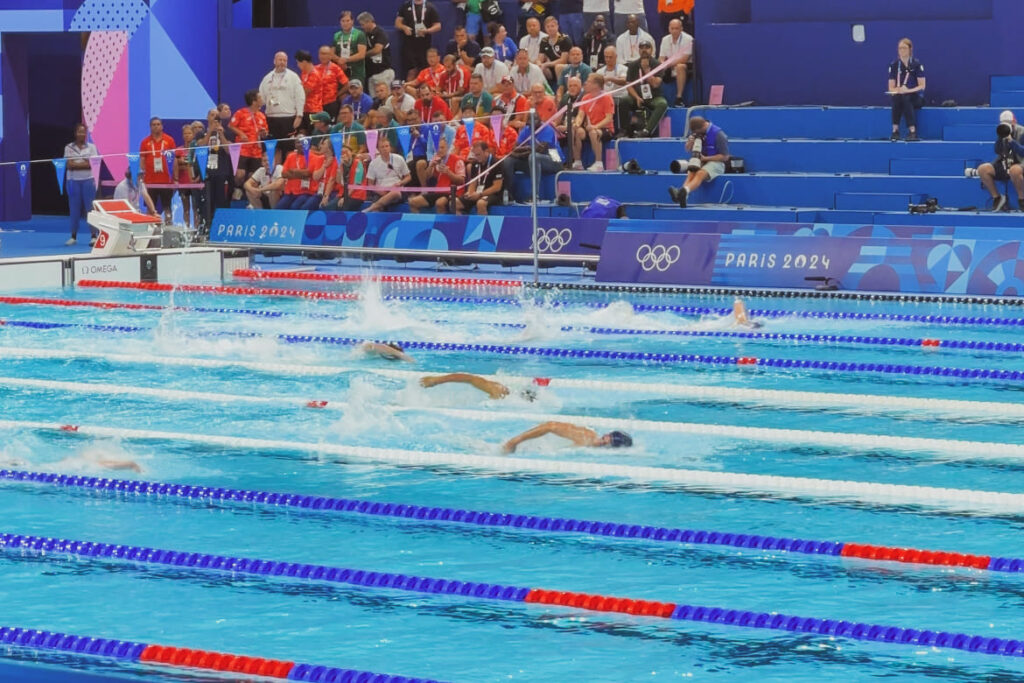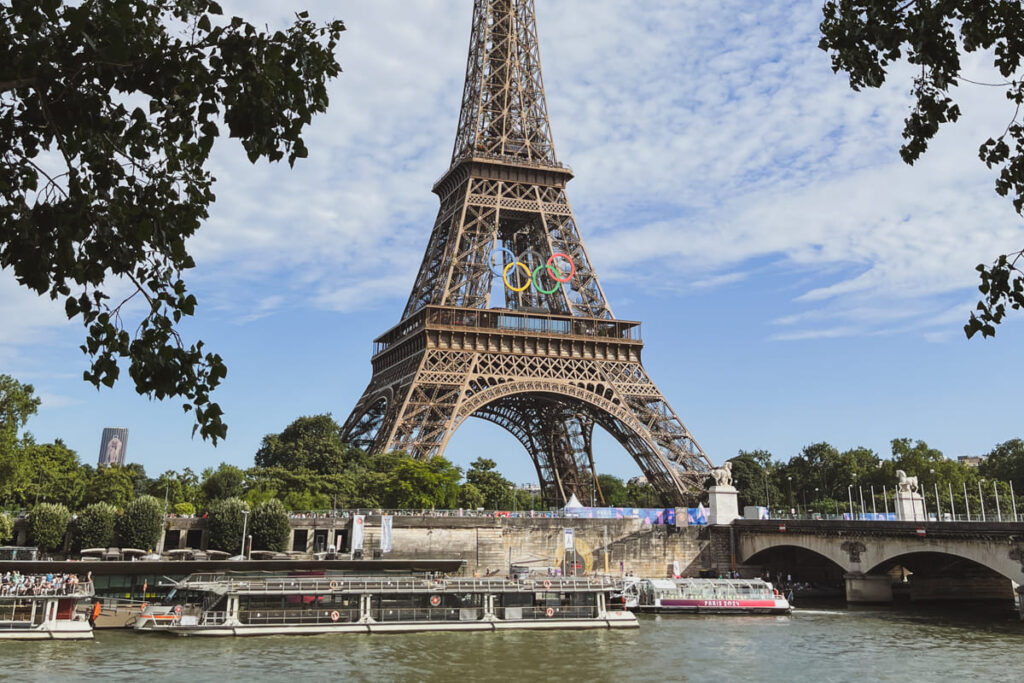Ever since I can remember I’ve been glued to the TV when the Olympics are on. I love the spirit, watching sports I’d usually never pay attention to, and that little dash of drama that comes with it. But up until now, it was something I was just happy to watch at home. I missed the Olympics in London just a few months before I moved here. So, when I realised that the 2024 Olympics would be in Paris, which is just a 2-hour train ride away for me, I knew I couldn’t miss out. Here’s a guide on what you need to know about getting tickets for the Olympics, planning your trip and making the most of your experience while you’re there.
How do you get tickets for the Olympics?

This article contains affiliate links. While we only recommend products and services that we believe in, we may get a commission from any purchases you make.
We started materialising the idea back in 2022 when the buzz around the event began. The first step was gathering the group – figuring out who wanted to go and what events we wanted to see. We decided to focus the trip around women’s Artistic Gymnastics. Since the games span two weeks, it’s important to have an idea about the dates you’re targeting.
Follow the Olympics on social media
The next thing I recommend is following the Olympics’ host page on social media. I happened to see an ad on TikTok, which is how I found out you could sign up to enter the ticket draw. This is very important – by signing up for the draw, you get the chance to be one of the first people to receive an allocated time slot and link to access the ticket purchase. Initially, the tickets were released in phases. So, sign up on the website, wait for your allocated slot, and make sure to mark the date and time on your calendar – for Paris, it was 11 am (local time). You’d receive your slot details 2 days prior.
Create a group chat
It’s crucial to keep the group in the loop and discuss things on a group chat. It’s also good if different people in the group sign up for the draw, as in our case there was a week’s difference between the slots two of us got allocated. Before you log in to buy the tickets, make sure the group agrees on which events you want to see. Try to find the preliminary events calendar – for example, we knew we wanted to see gymnastics, which was scheduled for the early days.
Decide the budget
You might not know the prices beforehand and the different ticket categories. In Paris, they ranged from 15€ to 900€ for a single ticket to an event. But, still, have an idea with the group on how much you’re willing to spend, and how many events you’d like to attend. This will be helpful because things move super fast when you are on the website, and tickets can sell out in an instant. You won’t have time to discuss with the group and wait for someone to reply while you’re on the website – as I like to call it, executive decisions need to be made.
One important thing to know is that at least for Paris, you had to select the same number of tickets for all events you purchased in one transaction. Also, the tickets were in the currency of the host country (in this case in Euros), so have your preferred card for international transactions ready to use. And lastly, ensure you have the necessary funds or allowance on the card. Once you’re on the website, be quick to select the events you want. Double-check dates, and locations – as in Paris 2024 there were events not only in other cities like Lille or Bordeaux but also surfing on the other side of the world!
It’s not always the case you’ll find the tickets you want or if you decide that you’d like to attend another event, keep checking the tickets website regularly because new tickets may become available. We managed to snatch tickets for swimming just a week before the Olympics and that’s usually one of the most popular sports.
How to plan your trip to the Olympics?

Accommodation
If you get your event tickets early, then it’s easier to plan where you’ll want to stay. Have an idea of where the venues are on the map and try to look for locations nearby or at least with good public transport links. I wouldn’t recommend using a car because there are always road closures, and you’ll need to worry about parking. Taxis get too expensive and coming back with the crowds can be a hassle. The hotel I stayed in wasn’t very central, but it had good transport links, and in a city like Paris you can get around quite easily on the metro.
We looked into accommodation about a year prior because that’s when the hotels opened the availability and booked with free cancellation to guarantee something as we were a group of 7. It turned out that we did another search two months prior and prices had actually decreased. So we changed to a new accommodation that was not only cheaper but better suited for the group – instead of a single dorm, we managed to get four double bedrooms.
Getting there
As for flights, or in my case Eurostar tickets, it’s hard to predict the best time to book. Tickets also get sold nearly a year before the dates, however, the first released prices may not always be the cheapest. You can either secure your ticket early or monitor how the prices fluctuate. To my surprise, due to a change of plans, I bought my Eurostar tickets only two months prior and paid less than my friends who bought them as soon as the dates got released.
The weeks leading to the Olympics

In the weeks before the trip, double check your hotel and flight/train bookings just to see if everything is in place and no changes were made. Start to plan your days around the events. Make sure you know the venue locations, how long you need to travel to them, and what transport you need to use. Save them as pins on Google Maps. Share important links with the group, and make sure to know the arrival times for everyone. Whoever booked the accommodation should share the address, check-in and check-out times.
I highly recommend installing the official Olympics apps. For Paris, the three main ones were:
Olympics app – the main app showing all the events schedules, news and medal updates.
Tickets app – where you can see your tickets saved with a QR code and details about entrance gates, seats and schedule.
Transport app – this one was very useful for purchasing public transport tickets. It was great that you could select multi-day passes with unlimited travel. I chose a 4-day pass that included metro, bus, train and the transport links to the airports all in one. I added it to my e-wallet and simply scanned my phone at the stations. This was extremely convenient and meant no queuing time at the stations. You could save your hotel and venues on the app, and it would give you the routes on public transport.
If you’re looking to also enjoy the destination, I recommend making bookings if there is a specific restaurant you want to go to. For attractions, make sure to check if they are operating as usual and book your tickets in advance.
What happens once you get there

Arrive early
The key thing is to know the schedule and arrive at the venue with plenty of time. In Paris, the recommended time was 1.5 hours. I have to say that sometimes queues were long and slow, like at Roland Garros Stadium, because it’s a venue with multiple matches. Even after arriving early, we missed the first few games of a tennis match because there was no queue system and volunteers were simply not at the right places to prioritise those who had matches first.
Food and drink
Make sure you have things with you like water and food. The events and waiting times can be long. There are always food and drinks stalls but they are expensive and may not suit your preferences. So for Paris, I always had my reusable water bottle from Larq. It’s very practical with insulation, a straw and a filter for a smooth finish that removes lead, chlorine, PFAS. There were numerous water fountains, and some venues labelled the taps in the toilets as drinkable water. Carrying fresh water was necessary in crowded events in the hot summer months. Also, small snacks and even sandwiches seemed to be fine to bring along.
It’s worth checking on the FAQs of the official website which items are allowed in the venues. This may also vary according to the host country.
Making payments
One important thing to note, in Paris, as the official sponsor was VISA, venues and merch stores only accepted VISA payments and cash at selected tills. So again, this may vary depending on the host country/sponsor but it’s worth knowing in advance. Because guess what, none of my travel bank cards were VISA!
Enjoying the Olympic vibes

Once you’re there, really embrace the spirit of the Olympics. It’s a great atmosphere, people want to have fun – they are open and friendly. Bring your flag or your country’s colours. Show your best sportsmanship and be supportive of the athletes. Sometimes, the pressure and competition nerves can get in the way of the performance but it’s always nice to have a supportive crowd. Even if you’re not lucky to see your country compete, just get in the spirit of the Olympics.
Be kind to local residents, as they may feel overwhelmed with so many people visiting their city at once and frustrated with some of the disruptions. Learn basic phrases and have your translating app at hand just in case. It could be useful when you want to ask for some information from volunteers. If you’re not in an event, there are fan zones with big screens and often restaurants will also have a TV showing some events.
Set aside some time to explore the city. There might be associated events, special landmarks and decorations scattered around the city related to the Olympics, like the rings at the Eiffel Tower. There could also be stalls with games and prizes!
What I loved about the Olympics is that, although somewhat crowded as you’d expect, there weren’t any rowdy crowds. It really felt like a much safer environment than other crowds at large-scale events, and a family-friendly one. I guess the fact that there were no alcoholic beverages sold at the venues made a huge difference.
All in all, for me it was four spectacular days in Paris. We got to see four amazing events – gymnastics, tennis, swimming and football thanks to the early planning. Everything logistics-wise in the city was smooth. It was a fun and safe environment, with a positive atmosphere. I hope this guide is helpful to you in future events too. Now, this experience has left me wanting to do it again. Does anyone want to join me in LA 2028?

